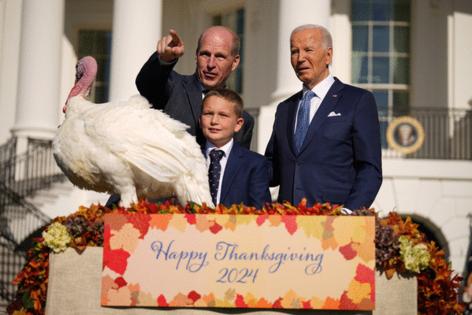Commentary: A drop of 'Mercy' on Thanksgiving
Published in Op Eds
The Founding Fathers had a lot to say about Thanksgiving. George Washington issued his Thanksgiving Proclamation in 1789. His successor, John Adams, recommended a day of fasting, humility and prayer.
But what about the Founding Mothers?
We’ve all heard of Abigail Adams, Martha Washington and Dolley Madison. Few, however, know historian, playwright, poetess, and scholar Mercy Otis Warren—and that’s a shame. Turning to Mercy on Thanksgiving is particularly appropriate, as she wrote with insight about the virtue of gratitude.
Mercy Otis Warren was a political woman among political men. Her father was a delegate in the Massachusetts House of Representatives, where her husband would later serve as speaker.
Her brother, James Otis, famously argued in colonial court against British writs of assistance—general warrants that allowed English soldiers to search American homes, ships and other buildings without concrete evidence that the law had been violated. Not only did these arguments portend the Fourth Amendment, but John Adams (who, along with Abigail, was friends with Mercy) wrote that “Then and there the Child Independence was born.”
Mercy herself anonymously published satirical plays and poems in the newspapers to drum up support for the patriot cause. They were often thinly veiled depictions and reactions to revolutionary developments in Massachusetts, where the Warrens resided.
For example, “The Squabble of the Sea Nymphs,” a poem about the Boston Tea Party, was published in The Boston Gazette. Her series of plays extolling the American patriots and debasing the loyalists were so popular that “Rapatio” (her chosen character name) became a recognized label for Thomas Hutchinson, the loyalist governor who enforced the despised Stamp Act.
Later, Mercy would participate in the debates surrounding the merits of the Constitution. Her “Observations on the New Constitution,” published under the pseudonym A Columbia Patriot, would help ensure the passing of the Bill of Rights.
She would become the third American woman to produce a significant body of poetry, a feat that caused Alexander Hamilton to write that, “in the career of dramatic composition at least, female genius in the United States has outstripped the Male.”
Finally, Mercy’s three-volume "History of the Rise, Progress, and Termination of the American Revolution" is one of the few written by a contemporary and the only Anti-Federalist (the name for the group of men and women who opposed ratification of the Constitution) account of the Revolution.
As early as 1791, Mercy observed that the American people were no longer as firmly attached to the republican principles that had birthed the Revolution. Ingratitude would soon follow, she felt, a vice that troubled her so deeply that she opens her "History" with a warning about it, noting that:
"the hurry of spirits, that ever attends the eager pursuit of fortune and a passion for splendid enjoyment, leads to forgetfulness; and thus the inhabitants of America cease to look back with due gratitude and respect on the fortitude and virtue of their ancestors."
And at the end, Mercy, ever the student of ancient history and philosophy, noted that the:
"ancient Persians considered ingratitude as the source of all enmities among men. They considered it 'an indication of the vilest spirit, nor believe it possible for an ungrateful man to love the gods or even his parents, friends, or country.'”
Ingratitude breaks down those earthly attachments that make us most human: our bonds to family, fellow citizens, country and ancestors. It causes us to forget that the prosperity we enjoy is not simply of our own making, that generations past made immeasurable sacrifices for the sake of their descendants.
When we no longer feel duty-bound to acknowledge and respond to what we’ve received, we open ourselves to meanness and break the goodwill of friends and family. Absent that goodwill and mutual trust, the civic ties of friendship unravel, later supplanted by utilitarian self-interest or, worse, the politics of resentment.
Like others of the Founding era, Mercy believed that the American system of government depends on a virtuous people. In a republic, the will of the people will ultimately prevail in institutions and laws. If the people’s reason surrenders to their passions and impulses, the law too becomes unreasonable.
It is worth remembering Mercy Otis Warren on Thanksgiving because, as she taught, gratitude is a consequential and tutoring virtue. We practice gratitude in our everyday lives by responding to gifts and services freely offered. We practice it as a nation by preserving our memorials and historic sites, and, with them, our heritage.
And, of course, we practice it on Thanksgiving, by gathering over a meal to celebrate the civic friendships that American acts of gratitude have made possible.
____
Brenda M. Hafera is the Assistant Director and Senior Policy Analyst at The Heritage Foundation's Simon Center for American Studies.
_____
©2024 Tribune Content Agency, LLC.




























































Comments